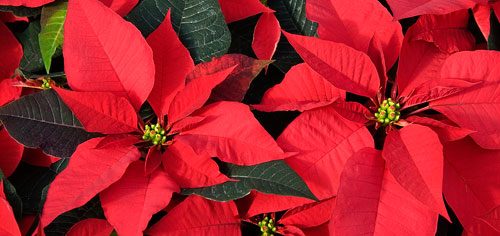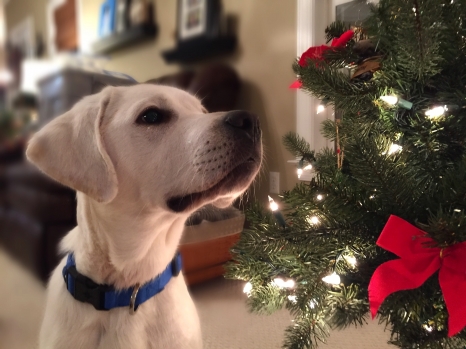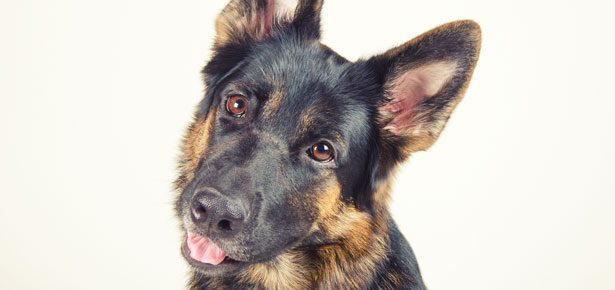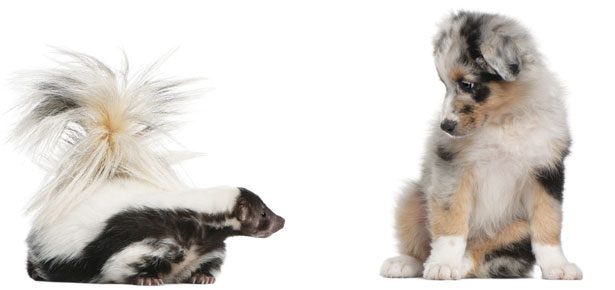

Which Holiday Plants are Toxic to Dogs?
Know which blooms and buds to keep from fido
Many people are decorating their homes for the holidays, but pet owners should be aware that some plants used for holiday decorating can be dangerous to cats and dogs. Understanding which plants are toxic, and which are not, can help bring home the festive spirit and avoid danger for pets.
One of the most popular holiday plants often considered poisonous are poinsettias. But in fact, they are “non” to “mildly” toxic and do not deserve their bad reputation. Pets that ingest poinsettias generally have no clinical signs or mild gastrointestinal discomfort. A mild rash may develop if rubbed on the skin, but they are considered safe to keep in the home.
Dr. Dorothy Black, clinical assistant professor at the Texas A&M University College of Veterinary Medicine and Biomedical Sciences (CVM), explained, “Poinsettias are usually referred to as highly toxic, but they really aren’t. Feel free to display them at Christmas.”

Christmas trees are also generally safe for pets. However, pine needles can cause damage to eyes if pets should run into the tree, such as a corneal laceration. Should pets ingest the sap produced by the tree, mild gastrointestinal discomfort may occur, but natural trees are generally non-toxic for cats and dogs.
Mistletoe, on the other hand, can be quite poisonous to pets. If ingested, pets may experience gastrointestinal upset, or show clinical signs of poisoning such as a change in mental function, difficulty breathing, or a low heart rate.
“If you see these symptoms in your pet and suspect or know they ingested mistletoe, you should seek veterinary assistance as soon as possible,” Black said. “Mistletoe shouldn’t be used where pets could possibly reach it.”
Another holiday decorative plant, holly, can be dangerous for pets and is considered poisonous. Clinical symptoms may be displayed as vomiting, diarrhea, decreased energy, and general upset stomach. Owners should seek veterinary assistance if they suspect their pets of ingesting holly.
Amaryllis and Daffodils are also considered poisonous for pets. If ingested, pets may vomit, appear depressed, or show signs of a painful abdomen and a loss of appetite.
“Some pets who consume amaryllis or daffodils will show symptoms of tremors,” Black said. “This can be a sign of severe toxicity.”
Lilies are particularly toxic to cats. The ingestion of any part of any type of lily can lead to kidney failure. The clinical signs can include vomiting, depression, or loss of appetite. If you suspect your cat of ingesting lilies, you should contact your veterinarian immediately. There is no antidote, and intense supportive care is needed for cats to recover.
“The more toxic the plant, the more careful you should be with displaying them in your home. While Poinsettias and Christmas trees are generally safe for pets, holly, mistletoe, amaryllis, daffodils, and lilies should be considered quite toxic,” Black said. “Pets should not be allowed to come in contact with poisonous holiday plants, and if they are displayed in the home they should be kept out of reach, and pet’s behavior should be monitored to make sure they do not show symptoms of poisoning.”
Join the newsletter and never miss out on dog content again!
"*" indicates required fields
By clicking the arrow, you agree to our web Terms of Use and Privacy & Cookie Policy. Easy unsubscribe links are provided in every email.






